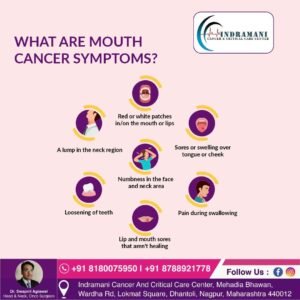
It’s a well-known fact that tobacco and its products are the reason behind a host of deadly health risks like respiratory diseases, heart conditions, and cancer. Studies clearly show that smoking and chewing tobacco are the highest contributors to the risk of oral cancers.
Due to a large number of tobacco consumers in the country, mouth cancer contributes to over 30% of cancer cases and ranks as one of the top 3 most common types of cancer. Statistics show that over five people succumb to oral cancer every hour every day, that’s how widespread this cancer is in India.
WHAT IS ORAL CANCER?
Oral cancer is a cancer type that develops in the mouth and throat tissues. Oral cancer falls under the category of head and neck cancers and develops in the mouth and throat tissues. This includes cancers of the lips, tongue, palate, gums, cheeks, and floor of the mouth. The use of tobacco like smoking cigarettes or chewing tobacco is the biggest risk factor and consumption of alcohol with tobacco puts you at even greater risk.
WHAT ARE MOUTH CANCER SYMPTOMS?
Early detection of oral cancer results in better, more successful clinical outcomes and even cures in many patients. The early stages of mouth cancer might appear differently in patients. The early symptoms of oral cancer might not be clearly evident and can have a variety of symptoms.
Some common symptoms of oral cancer include:
- Red or white patches in/on the mouth or lips
- Sores or swelling over tongue or cheek
- Pain during swallowing or chewing
- Lip and mouth sores that aren’t healing
- Loosening of teeth
- A lump in the cheek or neck region
- Numbness in the face and neck area
Regular self-examination is highly recommended, especially among smokers and tobacco chewers, and if you feel that any symptoms are not subsiding with time, it is highly recommended that you consult a doctor.
Check your mouth floor, tongue, and the insides like the gums and palate for any unusual lumps, spots or color changes. If any of these that you discover don’t go away in 3 weeks, get a professional opinion.
IS ORAL CANCER CURABLE?
Oral cancer is curable when detected at an early stage when the cancer cell mass/tumour is small and has not spread. It is hence important that one consults a specialist and gets any symptoms or cancer signs evaluated early.
HOW DO YOU DETECT ORAL CANCER?
The accurate diagnosis of oral cancer is crucial as it paves the way for the appropriate oral cancer treatment plan. Oral cancer detection starts with a close physical examination, checking the mouth, tongue, and cheeks for any suspicious growths or tumors. If anything is found, it is followed by a biopsy to check for cancerous cells. Other scans like X-Ray, MRI, CT, PET or endoscopy may also be performed to examine other parts and check if cancer has spread for a more accurate image.
Oral cancer is categorized into four stages:
Stage 1: Cancer has not spread and the size of the tumor is less than 2cms
Stage 2: The tumor cells still haven’t spread, but the tumor is slightly larger, about 2-4cms.
Stage 3: A tumor is now larger than 4cms and could have spread to a lymph node.
Stage 4: The tumors are large, and the cancer cells have spread to nearby tissues, lymph nodes or even other parts of the body.
CANCER TREATMENT AND SURVIVAL RATE OF MOUTH CANCER
Like most other conditions, the earlier oral cancer is detected, higher the chances of survival after treatment. If detected in Stage 1 or 2, the survival rates are over 80%, Stage 3 is around 65% while Stage 4 is 30-38%. So, timely diagnosis followed by appropriate treatment is crucial to make a satisfactory recovery. The treatment option depends on the location of the cancer and the stage of diagnosis. The possible treatments include surgery to remove a tumor, radiation, chemotherapy and targeted therapy to effectively kill the cancer cells. In more advanced stages, patients may require reconstructive surgeries to compensate for the missing bones or tissues and rehabilitative help like speech therapy for functional improvement.
